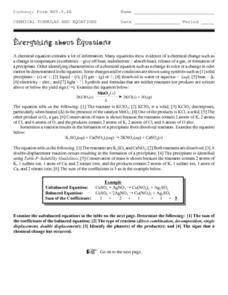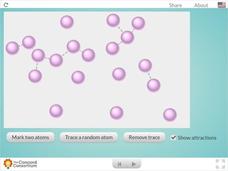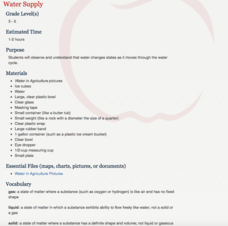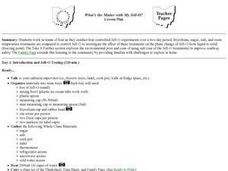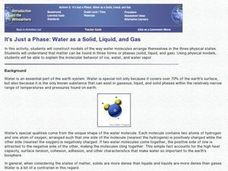Curated OER
The Conservation Of Mass (The Mass Of Gas)
Middle schoolers gain an understanding of matter in all of its phases. In this science lesson plan, students further their knowledge of the laws of conservation of mass, the loss in mass can be accounted for, when the gas is allowed to...
Curated OER
Everything about Equations
In this chemical reactions worksheet, students are given fifteen unbalanced equations and they must identify the reaction types, the phases of the products, the signs that a chemical change occurred and the sum of the coefficients of the...
Virginia Department of Education
Heat Transfer and Heat Capacity
It's time to increase the heat! Young chemists demonstrate heat transfer and heat capacity in an activity-packed lab, showing the transitions between solid, liquid, and gaseous phases of materials. Individuals plot data as the changes...
National Nanotechnology Infrastructure Network
Making a Liquid Crystal Thermometer
Introduce your classes to a fourth state of matter! Liquid crystals have a colorful sheen that changes based on different physical factors. Learners use this information to create a liquid crystal thermometer where the color of the...
Concord Consortium
Molecular View of a Gas
Welcome to the fast-paced life of a gas atom! Learners gaze at gaseous atoms up close using a colorful interactive. They can highlight two atoms and observe their movements within their container or follow the dizzying path of one atom...
Curated OER
Sometimes, solid + liquid = gas
Third graders experiment with common household liquids and solids. In this chemical reaction lesson, 3rd graders discuss phase changes and experiment to find other ways to create gases. They use water, vinegar, lemon juice, flour, baking...
Curated OER
States of Matter
Students categorize items into one of the three states of matter. They participate in a demonstration in which they represent particles of matter. Finally, they complete an experiment in which they "race" top see who can make acetone...
Curated OER
Matter And Its Changes
Fifth graders explore the phases of matter, make observations of matter, the physical and chemical properties of matter, solutions and mixtures, formation of molecules and atoms and molecules all through hands on activities.
Discovery Education
Cool It!
Adjust the melting time of ice without varying the temperature! Learners experiment with different materials to decide how the materials affect the rate an ice cube melts. They then connect their findings to the conductivity of each...
National Institute of Food and Agriculture
Water Supply
Participate in three activities that look at the earth's limited water supply and the changes water goes through as it enters each phase of the water cycle. The resource is complete with three activities that demonstrate the changing...
Curated OER
Solids, Liquids and Gases - Part 2
Students experiment with balloons, soda water and raisins to find out about the states of matter. In this solids, liquids and gases instructional activity, students complete a group activity with balloons to recognize the state of...
Curated OER
A Chemical Curiosity
In this chemical change worksheet, students review physical changes such as evaporation and condensation before working with chemical change. They conduct an experiment with vinegar and baking soda before recording the chemical changes...
Concord Consortium
Molecular View of a Solid
Why are solids, well ... solid? Take a peek inside a solid substance with an easy-to-use interactive. Science sleuths examine the motion and position of the atoms that make up a solid before drawing conclusions from their observations.
Curated OER
States of Matter and Gas Laws
In this matter worksheet, students review the states of matter and the gas law formulas and equations. Students then complete 7 multiple choice questions and 6 problems.
Curated OER
Solids, Liquids, and Gases
First graders explore the properties of matter. In this states of matter lesson, 1st graders conduct scientific investigations that require them to mix, cool, and heat objects in order to observe changes in the properties of matter.
Curated OER
Physical and Chemical Changes in Food
Ninth graders study food mixtures and substances in order to identify atoms, molecules, elements, and compounds and recognize physical changes that take place in foods.
Curated OER
Heating/Cooling Curve
For this heating and cooling curve worksheet, students use a given graph of a substance being heated from a solid to a liquid and then a gas over time. They use the graph to answer eleven questions about the phases of the substance and...
Curated OER
WS 7.5 Thermodynamics Concepts and Vocabulary
In this thermodynamics worksheet, students fill in the blanks with terms related to specific heat, calorimetry, phase changes, enthalpy, entropy and free energy.
Curated OER
The Same But Different
Fourth graders identify the characteristics of a simple physical change. They describe objects by the properties of the materials from which they are made. Students discuss the different states of matter and their distinct physical...
Mr. E. Science
Thermal Energy and Heat
The presentation covers Fahrenheit, Celsius, and Kelvin scales for temperature as well as conduction, convection, and radiation.
Curated OER
Phases of the Moon
Students use a simple physical model of the Earth, sun, and moon to understand why the moon changes phases from the perspective of Earthly observers. They hold up balls representing the moon in a room with a single light source to see...
Curated OER
What's the Matter with My Jell-o?
Young scholars work in teams of four as they conduct four controlled Jell-O experiments over a two-day period. The Family Page extends this learning to the community by providing families with challenges to explore at home.
Curated OER
It's Just a Phase: Water as Solid, Liquid and Gas
Students construct models of the way water molecules arrange themselves in three physical states - solid, liquid, and gas. They explain the molecular behavior of ice, water, and water vapor.
Curated OER
Heat Transfer
The students construct a heating curve and explain its components. They perform calculations. They review phase changes and quantify Energy differences. They review phases of matter and their energy content.



